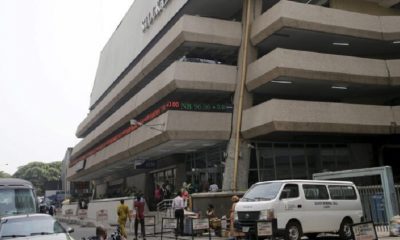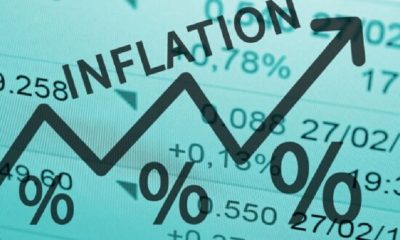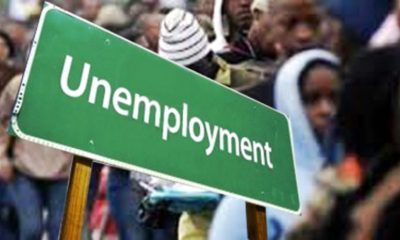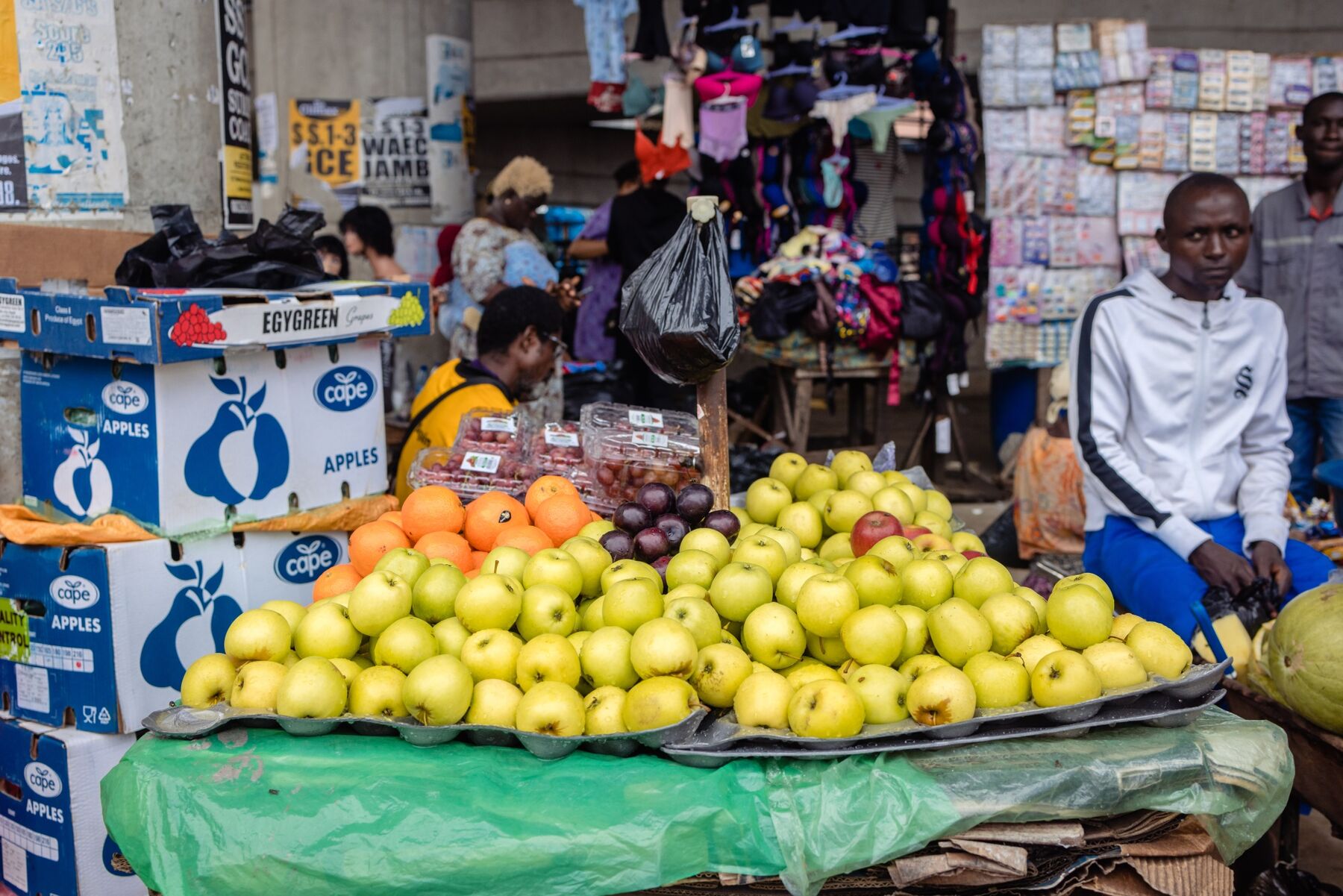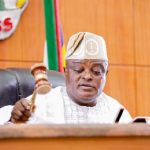General
NBS Puts Nigeria’s Unemployment Rate at 4.1% in Q1 2023
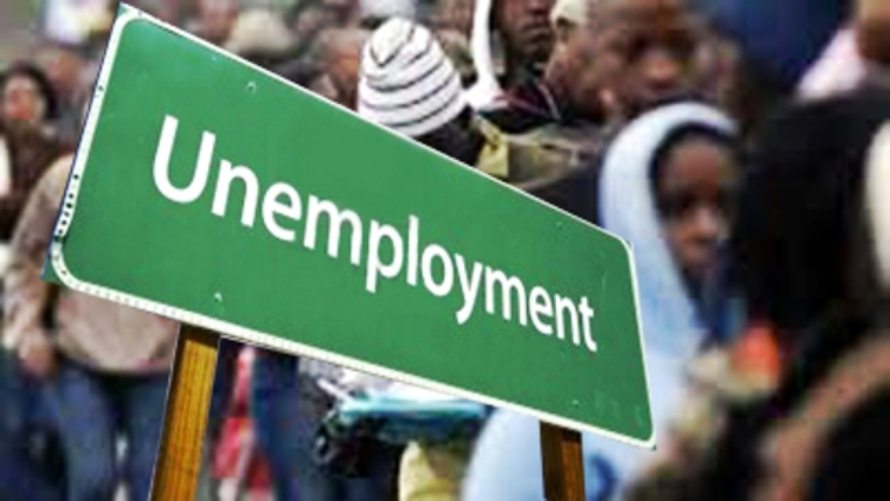
By Adedapo Adesanya
Nigeria’s unemployment rate stood at 4.1 per cent in the first quarter of 2023, in contrast to 5.3 per cent in the fourth quarter of 2022, the National Bureau of Statistics (NBS) said on Thursday, following a revision of how the numbers are now calculated.
The statistics office said this in its Nigeria Labour Force Survey (NLFS) report for Q4 2022 and Q1 2023, launched on Thursday, the first of its kind in over two years.
Business Post had in March 2021 reported that Nigeria’s unemployment rate rose to 33.3 per cent, translating to some 23.2 million people, the highest in at least 13 years and the second-highest rate in the world.
The figure jumped from 27.1 per cent recorded in the second quarter of 2020 amidst Nigeria’s lingering economic crisis, made worse by the coronavirus pandemic. The unemployment rate in the country has more than quadrupled since 2016, when the economy slipped into a recession.
In April 2021, Nigeria’s Minister of Labour at that time, Mr Chris Ngige, claimed that the World Bank questioned the methodology employed by the NBS to generate its employment statistics.
At the time, the NBS dismissed Mr Ngige’s claim, adding that the World Bank never questioned its methodology.
Now, on Thursday, the agency said it has enhanced its methodology of collecting labour market data through the Nigeria Labour Force Survey (NLFS) in line with International Labour Organisation (ILO) guidelines.
“The data collection for the revised NLFS is based on a sample of 35,520 households nationwide.
“It is conducted continuously throughout the year, with national-level results produced quarterly and state-level results at the end of a full year,” the NBS said.
A breakdown of the new report showed that About three-quarters of working-age Nigerians were employed 73.6 per cent in Q4 2022 and 76.7 per cent in Q1 2023.
This, the report said, most people were engaged in some jobs for at least one hour a week, for pay or profit.
It said about one-third, equivalent to 36.4 per cent in Q4 2022 and 33.2 per cent in Q1 2023, of employed persons worked less than 40 hours per week in both quarters.
“This was most common among women, individuals with lower levels of education, young people, and those living in rural areas.
“The underemployment rate, which is a share of employed people working less than 40 hours per week and declaring themselves willing and available to work more, was 13.7 per cent in Q4 2022 and 12.2 per cent in Q1 2023,” it said.
The NBS said the share of wage employment was 13.4 per cent in Q4 2022 and 11.8 per cent in Q1 2023.
“Most Nigerians operate their businesses or engage in farming activities. The shares are 73.1 per cent and 75.4 per cent in Q4 2022 and Q1 2023, respectively.
“A further 10.7 per cent in Q4 2022 and 10.6 per cent in Q1 2023 were engaged in helping in a household business,” it said.
In Q4 2022, 2.6 per cent were engaged as Apprentices/Interns and 2.2 per cent in Q1 2023.
“Unemployment stood at 5.3 per cent in Q4 2022 and 4.1 per cent in Q1 2023.
“This aligns with the rates in other developing countries where work, even if only for a few hours and in low-productivity jobs, is essential to make ends meet, particularly in the absence of any social protection for the unemployed,” the NBS said.
It noted that 22.3 per cent of the working-age population was out of the labour force in Q4 2022, while it was 20.1 per cent in Q1 2023.
General
Obasa Makes First Appearance at Lagos Assembly After Impeachment
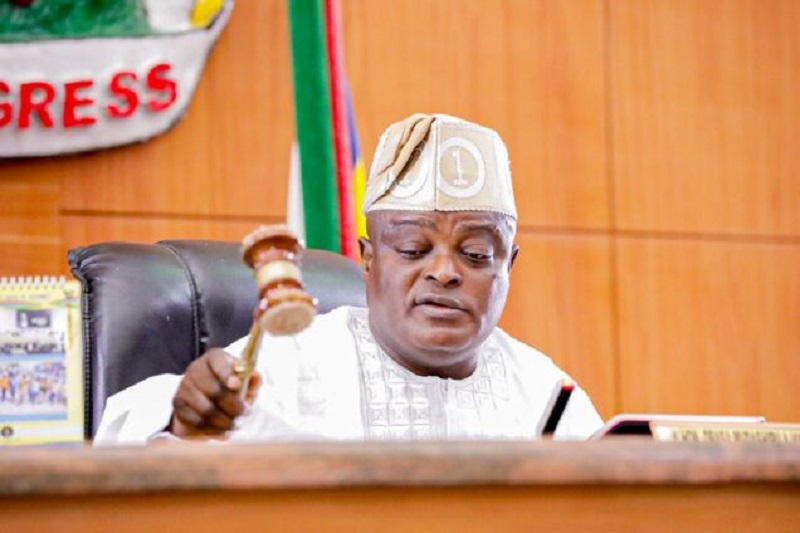
By Adedapo Adesanya
Mr Mudashiru Obasa made his first appearance at the Lagos State House of Assembly complex on Thursday, February 27, 2025, after he was impeached as the Speaker on January 13, 2025.
The former speaker entered the chamber flanked by armed and uniformed security operatives, who ushered him into the premises.
Business Post reports that Mr Obasa was welcomed with an ovation by his supporters and well-wishers
The politician was welcomed at the entrance gate of the Assembly Complex.
The 40-member House removed the Agege I representative as Speaker by more than two-thirds of the house over alleged misconduct and corruption offences.
Mr Obasa’s then deputy, Mrs Mojisola Meranda, was immediately elected the new Speaker, becoming the first female to take charge of the legislative body in the South-West state.
With her emergence, Mrs Meranda, who represents Apapa Constituency I, ended the 10-year reign of Mr Obasa on the seat.
Mr Obasa was first elected into the House in 2007. He has been in the chamber since then. He emerged as a speaker in June 2015 before his removal in January 2025. He is believed to have the strong support of President Bola Tinubu, who reportedly asked for his return and the resignation of Mrs Meranda.
It is not immediately clear what the next development will be with his return to the chamber, but Mrs Meranda has about 36 members of the state parliament as loyalists. They have all supported and passed a vote of confidence on her, insisting that Mr Obasa has no room to return to the position despite claiming he was not lawfully removed from office.
Last week, some agents of the Department of Security Services (DSS) and legislative workers clashed in the chambers.
The incident led to 36 lawmakers passing a vote of confidence in Mrs Meranda, who was teary-eyed.
Meanwhile, the police had earlier allegedly withdrawn all the escorts attached to the speaker.
General
EFCC Laments Crypto Funding of Fraud Syndicates’ Cells

By Adedapo Adesanya
The Chairman of the Economic and Financial Crimes Commission (EFCC), Mr Ola Olukoyede, says organised foreign fraud syndicates are establishing cells in Nigerian cities and recruiting youths into serious organised cybercrimes, made easy by cryptocurrencies.
This was disclosed by the anti-graft agency in a statement signed by its spokesperson, Mr Dele Oyewale, on Thursday in Abuja.
Mr Olukoyede said this while receiving participants of the Executive Intelligence Management Course (EIMC) 18 of the National Institute for Security Studies (NISS) on Wednesday in Abuja.
He said the team was led by the institute’s Director of Studies, Mr Hyginus Ngele, to the commission.
Mr Olukoyede expressed surprise at how bandits and insurgents were able to sustain their activities in the country over the years.
He noted with concern, the rate of flow of small arms and light weapons across the borders and the involvement of non-state actors in the illegal exploitation of minerals in parts of the country.
The EFCC boss said all these activities compounded the threats in the security landscape.
“Another dimension that is not given attention is the discovery, recently, that organised foreign fraud syndicates are establishing cells in Nigerian cities.
”They are recruiting young Nigerians into serious organised cybercrimes, including cryptocurrency fraud.
“By the virtue of EFCC’s recent discovery, we are beginning to see the likelihood, the propensity that a lot of these people are into illegal importation of arms into the country using cryptocurrency as means of payment.”
According to him, this is an area that must interest all and sundry.
“In the special operations we carried out in Lagos recently, we arrested 194 foreigners in the heart of Victoria Island.
”They comprised Chinese, Filipinos, Eastern Europeans, Tunisians and among others in one building at a time. You can imagine what these guys are doing, 194 of them.
“Some of them don’t even have valid visas and most of the financial activities they carried out were through cryptocurrency,” he said.
He said the commission also discovered that some of the foreigners arrested were already ex-convicts in their countries.
“Some of them have been convicted and escaped from their countries and found safe haven in Africa, not only Nigeria.
“We discovered that they are also developing cells in some other African countries by virtue of the investigation we are carrying out,” he said.
The EFCC boss called for spirited efforts at both national and continental levels to combat the menace of internet fraud.
He stressed that the money laundering and national security dimension of the presence of foreign organised crime groups demanded close scrutiny.
“All security, intelligence and law enforcement organisations in Nigeria and indeed Africa, must close ranks in dealing with this challenge,” he said.
On his part, the NISS commandant, Mr Joseph Odama, who spoke through Mr Ngele, praised Mr Olukoyede’s leadership of the EFCC for the commission’s “remarkable achievements in combating corruption, money laundering, and other financial crimes.”
He noted that the achievements had not only strengthened Nigeria’s integrity but also served as a model for other nations in Africa and beyond.
He said the EFCC, under Mr Olukoyede, had been at the forefront of investigating and prosecuting financial crimes, including those involving non-state actors.
“Your commission’s exploratory activities have uncovered the intricate networks through which some NGOs and other entities channel funds to support hostile non-state actors, thereby, fueling instability in various parts of the country and the African continent.
“We recognise the critical role the EFCC plays in disrupting these networks and ensuring accountability.
“In light of this, we are particularly interested in hearing your insights on how your commission navigates the complexities of investigating and prosecuting cases involving non-state actors.
“We also seek your contributions on how Nigeria and other African nations can strengthen legal and institutional frameworks to address the challenges posed by these actors while promoting transparency and accountability in their operations.”
General
NSCDC Intercepts 1,571 Litres of Petroleum Products in Zamfara
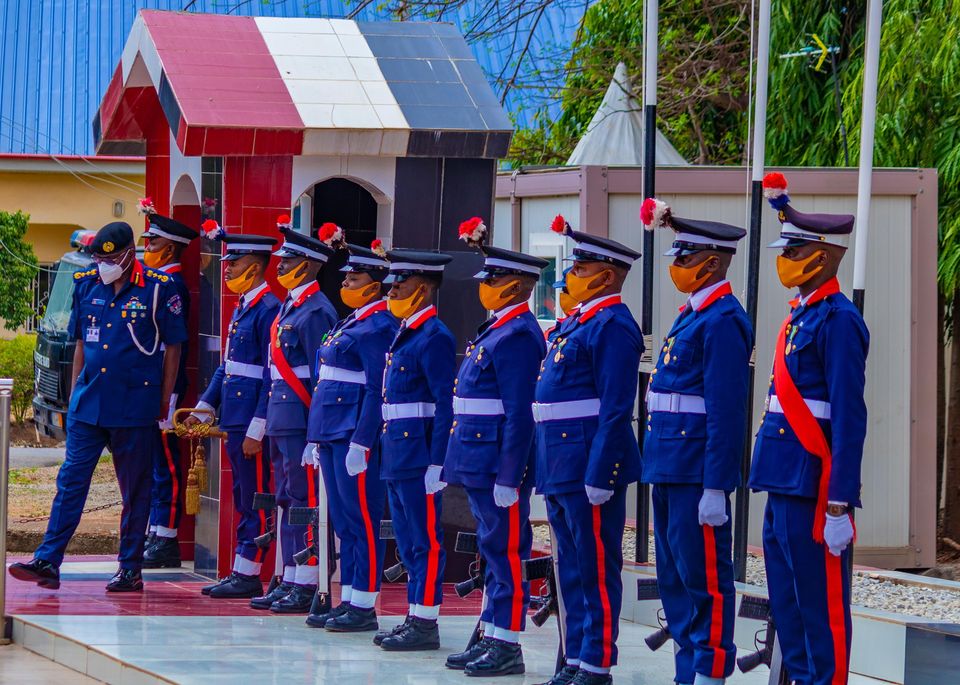
By Adedapo Adesanya
The Zamfara State Command of the Nigeria Security and Civil Defence Corps (NSCDC) has intercepted 1,571 litres of petroleum products in the Northern state.
According to the security outfit, the products were illegally transported in jerry cans to banditry-prone areas.
The State Commandant, Mr Sani Mustapha, in a statement by the Public Relations Officer of the command, Mr Umar Muhammad, revealed that four suspects were arrested in connection with the crime at two separate locations.
Among them were two filling station pump attendants and two buyers apprehended in the Birnin Magaji and Tsafe Local Government Areas of the state.
Mr Muhammad disclosed that aside from transporting fuel from unauthorised locations, the suspects also violated the Executive Order prohibiting the sale of petroleum products in jerricans within Zamfara State.
He stated that two of the suspects were caught in Birnin Magaji with 1,296 litres of fuel, while the other two were arrested in Tsafe with 275 litres of the product.
“Today, we bring before you four suspects apprehended for illegal dealings of Premium Motor Spirit (PMS) in large quantities, violating the National and State Executive Order of petroleum products sales to retailers in jerry cans,” he stated.
The NSCDC assured citizens that investigations are ongoing and reaffirmed its commitment to enforcing the law to curb illegal fuel diversion and activities that could aid insecurity in the state.
-

 Feature/OPED5 years ago
Feature/OPED5 years agoDavos was Different this year
-
Travel/Tourism9 years ago
Lagos Seals Western Lodge Hotel In Ikorodu
-

 Showbiz2 years ago
Showbiz2 years agoEstranged Lover Releases Videos of Empress Njamah Bathing
-

 Banking7 years ago
Banking7 years agoSort Codes of GTBank Branches in Nigeria
-

 Economy2 years ago
Economy2 years agoSubsidy Removal: CNG at N130 Per Litre Cheaper Than Petrol—IPMAN
-

 Banking2 years ago
Banking2 years agoFirst Bank Announces Planned Downtime
-

 Sports2 years ago
Sports2 years agoHighest Paid Nigerian Footballer – How Much Do Nigerian Footballers Earn
-

 Technology4 years ago
Technology4 years agoHow To Link Your MTN, Airtel, Glo, 9mobile Lines to NIN




